Lemme Caution
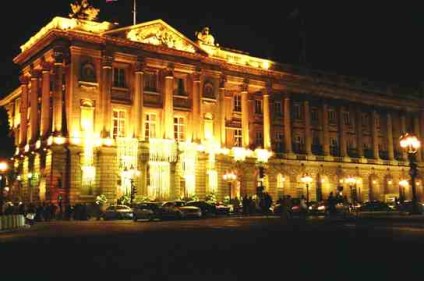
(The United States Embassy Paris, near the Place de la Concorde.)
The US Embassy is an impressive pile of stone located near the bustling Place de la Concord. We were waved through the gate and the Captain slid the black Ford sedan into a parking place near the front entrance. We were waved in by the trim Marine at the entrance and trudged up the grand staircase in massive public lobby to the office of the Naval Attache. First thing upon arriving at his office, Captain DeWolf said “I need to have your passport, because you can’t do the job with the Surete’ with that in your possession. You need to look like you are coming from a Navy ship, not flying into Orly from the States.”
I handed over my passport reluctantly. The Captain could sense my unease.
“Trust me, if anything goes wrong on the project to which I am sending you, the Surete’ will keep you covered. Relax and let them tell you what to do. Don’t go Lemme Caution on us.”
I was puzzled. “What do you mean by that?”
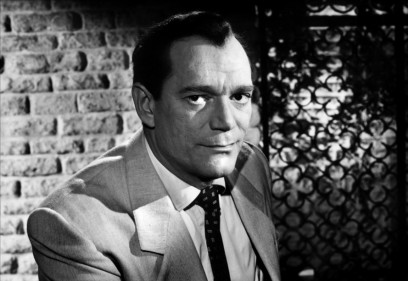
(Eddie Constantine at the height of his fame.)
The Captain laughed. “Lemme is a character played by a Yank named Eddie Constantine. He is from LA, and plays a hard-boiled private dick. He is always getting into impossible situations and getting out of them. The French think he is a sort of Humphrey Bogard, only tougher. He is getting quite a reputation here. That is not what you are here to do.”
“OK, no tough guy stuff. I will just be a sailor on liberty.”
“Bingo. Now, what do you need in the way of support from me?”
“I am going to need some kind of papers to go with my military ID, if I am supposed to be on leave or liberty.”
“I can do that,” he said. “I am the Navy SOPA- Senior Officer Present Ashore- in Paris. Let me cut you some leave orders.”
He found a form and handed it to me as I sat down at the typewriter. I asked him what carrier was assigned to Sixth Fleet at that time. He gave me the name of the carrier and I wrote myself 30 days leave from the Deck Division. I believe I put down that the officer who had approved it was a W. T. Hatch, LCDR, USN, and I asked the Captain to please scrawl some kind of signature that made it look halfway good.
At the time, I did not know there was a CDR Hatch in Naval Intelligence, which could have been inconvenient if it came up. Captain DeWoIfe scrawled a signature on the papers and opened the lower drawer on his desk and handed me a thick envelope. I glanced in it and saw a substantial amount of U.S. currency. “You are going to need this where you are going. Do not get receipts. We do not want it looking like you are on official business.”
“How will I do my travel claim?” I asked.
The Captain looked at me and smiled. “Tom, you are off the books on this mission. We will take care of the reimbursement up front. This cash is not accountable. But don’t waste it. If you need more, call my Executive Assistant Barbara.” He jotted down a couple phone numbers on a sheet of paper and handed it to me. “Here is her office direct line and the phone number at her apartment. Never come to this office again.”
“Roger that,” I said.
“Now, at exactly noon you will be met on the street corner just outside this building. I will take you down now and show you where it is. A man by the name of Christides will pick you up and take you for the first meeting with the Surete,’ I wish you good luck.”
I thanked him for that, and wondered what Eddie Constantine would have said.
From the side door, he pointed out the corner where I was supposed to wait, shook my hand, and vanished back into the building. I dodged my way across the streets, the little cars roaring past, people strolling and peddling madly on bicycles. I smoked a cigarette and tried to look unobtrusive. Just as Captain DeWolfe had said, promptly at noon a little white Citroen pulled to the curb and the window rolled down. The man behind the wheel was wearing a car-coat and a grey fedora. “My name is Christides,” he said. “I am here to you and take you to a meeting we are having with Counterfeit Section of the Surete’. Get in.”
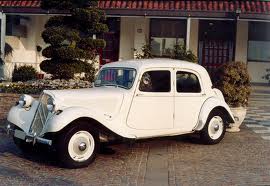
(1952 Citroen.)
I walked around to the passenger side and climbed in. We roared off in a cloud of blue smoke. Christides was smoking one of those Gaulois cigarettes that smell different from real ones made out of Virginia tobacco. I lit up a Lucky and looked at Paris rolled by as the agent drove purposefully through the bustle. We parked haphazardly outside a Moroccan restaurant, and inside there was a large private booth where several men were seated drinking coffee.
Christides pointed to the oldest man there and said, “This is Detective Inspector Benhamou.”
“Pleased to meet you,” I said.
“Bonne journée, monsieur Duval. Je suis le chef de la section counterfiet de la Sûreté;. Comment sont vos compétences linguistiques en français?”
“Sorry,” I said. “I may have a French surname, but I don’t speak the language.”
“Bien. That is perfect. I wanted to be sure. I am chief of the Counterfeit Section of the French Surete.’” These are my associates,” he said with wave at the other five gentlemen at the table. “You will be working with them in Nice, on the Cote D’Azure.” The men nodded in recognition. “Now for some lunch.” He waved at the dark-skinned waiter and some tasty food emerged presently- succulent lamb, couscous and sautéed vegetables on a bed of white rice with a delicate white wine, crisp and refreshing. I am mostly a beer man, but I could see that I could get to like it here.
As we were eating lunch, now and then Christides would ask me to answer a question that one of them had. I remember distinctly that twice I was asked if were I sure that I did not know any French language. I did not realize at the time what they meant by that, but I would later. Also, from time to time they would tell me what I would be doing to assist them in Nice on the forthcoming project. It was at this point that I realized that I was not there as an advisor on counterfeit problems, obviously, they had the experts.
What they were looking for was a pigeon they could put in with the flock of counterfeiters. Damn, I thought. I might actually wind up having to go Lemme Caution after all, even if the Captain warned me not to.
After a very long lunch, I was given two tickets- a billet and a reservation- that would get me from the Gare du Nord in the 10th Arroundisment to Nice and Christides started writing on scraps of paper. “First, take a cab to the Gare de Nord in the 10th arrondissement as it is written here. When you arrive at the train station, have your ticket in clear view and start walking down the train platform. You will be directed into the car that matches the ticket. Once the train gets underway, from time to time one of the people here will be passing through the train car. Never react to them, or give any indication you know them.”
“Roger that,” I said, realizing I was going undercover.
“Eventually, when the team is certain the train was clear, one of us will approach, stop, and light a cigarette in your clear view. At half a car distance between you, get and follow to the compartment that the Surete’ had taken over for the trip.”
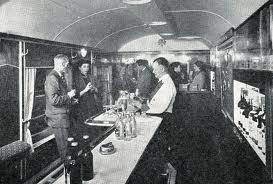
“Got it,” I said. I rose from the table, got my coat and walked out onto the boulevard to hail a cab. The train station was no problem, and I was directed to the proper car as I had been told. Apparently the train was clear of counterfeiters, low-lives and other criminals. I linked up with the team, and as we rolled through Provence and toward the coast we enjoyed a fine meal in the dining car and the evening set in. There was a lot of chit-chat in French that I could not follow. Now and then Christides would tell me what they were talking about. What I couldn’t follow I filled in the excellent wine.
When we arrived in Nice, as instructed, the Surete’ members disappeared to various places on the train and I was told to wait a few minutes after arrival and then just walk off and get a taxi. They had given me a scrap of paper with the name of the hotel and said” “ Take a taxi to the hotel and your team members will meet you there.”
I never had such service in a French hotel. When I arrived, obviously, they knew who I was in company with. I was shown a room right up at the top of the flight of stairs from the lobby. It was a very nice room and I noticed that there were doors leading off to the right and left. It didn’t take long to realize that was where Surute’ team were with me were booked up. They instructed me that anytime there was a knock on the door, I was to ensure that both those doors were shut and nobody got the idea that I was associated with them.
I am no fool. I doubt if anyone in the hotel did not at this time fully understand what was going on. That afternoon after lunch, we started the project. I was told that one of the inspectors would be walking down the street and I was to follow him when he left the hotel and keep about a half block distance from him. He would finally stop in front of a bar and light a cigarette. Then I was to follow and just get an idea of where it was located, because that night I was to go to that bar. They were sure this was the hangout of the Corsican counterfeiters.
So there it was. I wasn’t Eddie Constantine. I was going to be a pigeon. I shrugged, laid down on the bed and nodded off for a couple hours. I guess the French live like this- a snap in the afternoon might help me deal with the Corsicans with more energy. The evening was likely to be interesting, I thought.
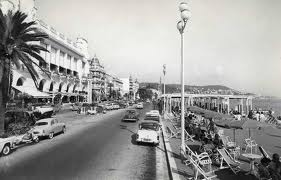
(Hotels and the beach at Nice, on the lovely Cote D’Azure.)
Copyright 2013 Vic Socotra
www.vicsocotra.com
Suivre Les Gaie
Part One
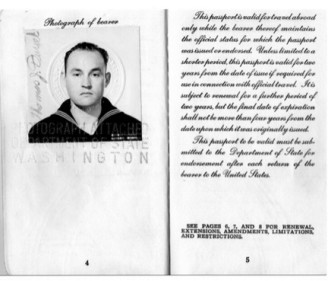
Memorandum for the Director of Naval Intelligence
The Pentagon,
Washington, D.C.
“May I take this opportunity of commending Mr. Duval for his efforts in this matter; without the knowledge of the French language, he was able to make contact with one of the cleverest band of Corsican counterfeit passers operating in the Mediterranean Basin, a band which the Surete’ Nationale had been trying to disperse for a number of years; he obtained the confidence of the members of this band who, heretofore, had boasted that no police officer would ever enter into their organization under the guise of a purchaser. He did this through his own resourcefulness, as no one was there to guide him while in contact with members of this band.”
Very truly yours,
A.A. Christides
U.S. Treasury Representative,
Paris, France
I worked with Tom on this account of his operations in Marseilles, France. It is an interesting tale in several regards. It seems quaint in context, particularly after the repeal of don’t ask-don’t tell. He thought it was funny, and produced the passport he carried to demonstrate the bona fides of the tale. I began to poke around the edges of the story, and some of his comrades conveyed the results of my conjecture to him. He got agitated with me, and said that I could publish the story only with his words.
I was working on the story of another legend in Naval Intelligence at the time- CAPT Tony Marslow had just passed. He was a reservist, and one of the handlers of mobster Lucky Luciano, who offered his unique services to the Office of Naval Intelligence before, during and after the Operation HUSKY invasion of Sicily. There are some tantalizing things about the connection, and I was following a line of investigation that suggested perhaps the end of the war had not ended the connection between the Spooks and the Mob.
In deference to Big Smoke, I will not continue that line here, though I may get back to it. Instead, I will continue to ignore Sequestraion (two more days and the world ends) and return with you to Washington in the early days of the Cold War, and the adventures of one of our Tough Guys from long ago. We will start with this:
“December 31, 1952
In late November 1952, I was assigned to the Washington District Intelligence office, located on the pleasant grounds of the Naval Observatory. When I had received this assignment. Bill Abbott, Director of Counterintelligence, Office of Naval Intelligence, had me take up residence on Wyoming Avenue. Today it is the first large building on the left of an old home and it has a sign on it that reads: “French School.”
Directly across from this is a white office building that was the office of the SDEC Director in the United States, one Philipe Thyraud de Vosjoli, who was head of French Intelligence in the United States (and had a beautiful assistant by the name of Janine but that’s another story). Halfway down the block on Wyoming Avenue was the home of the Director of Naval Intelligence, Rear Admiral Carl F. Espe.
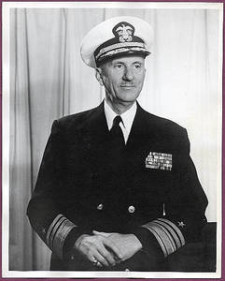
(DNI Carl Espe. Photo USN.)
As we generally went to work about the same time, we often would stop and have a few words. It was the last week in November 1952 when I was told that my boss, the District Intelligence Officer, Captain Noble Abrahams, wanted to see me. He called me into his office and said “Tom, the DNI needs to see you right away. One of the agents is bringing a car around to take you up to the Pentagon and will wait to bring you back.”
I nodded. You do what the DNI wants. When we arrived at the DNI’s office, the secretary told me to go right in, ‘they’ were waiting for me. I went into the office and and there were several people there with Admiral Espe. The Admiral immediately
went into the problem at hand and stated that whenever Sixth Fleet vessels went into French ports, it was flooded with counterfeit U.S. currency, and the French were getting very upset over this. No military organizations in Europe would give them any assistance and the U.S. Treasury Department had no agents in Europe to deal with the massive amounts of counterfeit dollars.
At that time in the 1950’s all military and U.S. Government personnel stationed in Europe were paid in MPC (Military Payment Certificates) except Naval Personnel stationed aboard ships operating in the area. Needless to say, although they were supposed to have exchanged their dollars for local currency they knew they could get much more on the Black Market.
The DNI went on to say that he remembered many times on his visits with me in Yokosuka, that I often mentioned that we had problems with counterfeiting.
What would I think of going to France and helping the Surete’ out with the problem they had? I, of course, told him I was ready to leave immediately when somebody spoke up and said “Admiral, he has to get a passport and that’s going to take at least 48 hours.”
Admiral Espe said “All right. Then let’s get on with the problem and stop talking about it.” He looked over at me and then said: “Tom while you are gone, I will take care of your apartment.” With that we were dismissedo. The agent was standing there who had brought me to the Pentagon. The Captain told him, “Take Tom and get him into uniform — he has to be in uniform for this project. Get him up to BUPERS at the Navy Annex and start processing him to get a U.S. passport.”
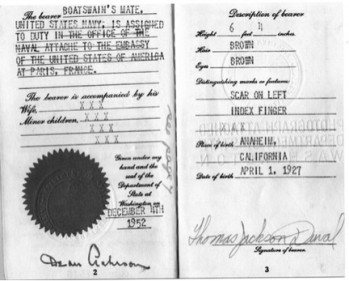
It was a whirlwind of activity, but we got it done. In the first week in December, 1952, I departed from the MATS (Military Airport Transport Service) Terminal, Washington National Airport, arriving at Orly Airport near Paris on the first Sunday in December.
I was met by a gentleman in civilian clothes who stated that he was Captain Maurice DeWolf, the ALUSNA (US Legation U.S. Naval Attache) Paris France. We went out to his car, which was illegally parked and one of the perks of being a diplomat. We then drove on to his office at the Embassy at 2 Avenue Gabriel in Paris.
That is when things started to get interesting. I will have to tell you more about that tomorrow.
Copyright 2013 Vic Socotra
www.vicsocotra.comRenee Lasche Colorado springs
Crackers
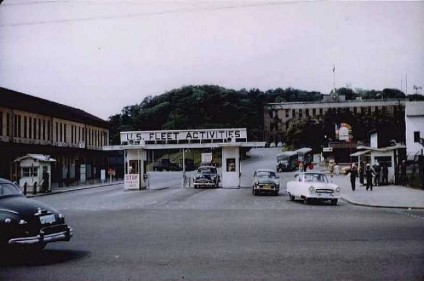
(Main Gate to Fleet Activities Yokosuka, circa 1952.)
I had to pass along the sad news about the passing of Tom “Big Smoke” Duval yesterday, and since there is no good obituary is available, I thought I would let him tell you something about his life and times. With the controversy over the water-boarding scenes in the Hollywood version of real life in the film “Zero Dark Thirty,” Big Smoke’s account of counter-intelligence work in the Occupation of Japan is interesting. I will let Tom tell you the rest, himself.
“Everywhere you turned around there was another hole in security at the sprawling naval complex at Yokosuka, and it was hard to tell where purely criminal activity blended into espionage. That is why it was so important to work with the native Japanese, since getting information out of prisoners is a thorny question.
Maybe I should rephrase that. Getting accurate information is hard.
Even in America, the Police have always had their ways here in America, and the sweat-session and occasional beating is the very essence of the Sam Spade-style detective novel. The problem with that sort of approach is that often the information that is produced is bogus, and manufactured just to get the pain to stop.
The American POWs who were so badly tortured in the prisons of North Vietnam spun incredible tales to try to satisfy their captors. There were interrogation notes that featured diagrams of the live-stock pens, swimming pools and bowling alleys on the aircraft carriers that operated off the coast.
When the truth became known to the Northerners, that their brutal sessions had only produced fantasy, the consequences for the prisoners were dire.
That is one of the surreal aspects about the current controversy over the water board procedure tactic, and whether the CIA should be permitted to utilize it in a small number of cases. It was introduced into the American training syllabus for survival, evasion and resistance school just to give a taste of how bad things could be in the hands of the enemy.
There was a time when the argument would never have occurred to anyone.
When WW II ended, the US Navy ships at the former Imperial Navy Base at Yokosuka off-loaded all the ammunition and stores they could in order to make space for troops to ride the ships back to America in the great demobilization.
There was a lot of stuff to get rid of. Plans for the invasion of the Home Islands, code-named “Operation Olympic,” had called for massive amounts of materiel to be on hand in the Far East for a protracted and bloody struggle.
Every Purple Heart Medal for wounds in action awarded since 1945 comes from the stock that was created just for that campaign. Say what you will about the horror of the atomic bombings of Hiroshima and Nagasaki, the mute evidence of those awards is enough for me.
Meanwhile, I was on my way to clean up the zone of naval occupation south of Yokohama. Corruption was rife, and the Army was threatening to take jurisdiction if the situation was not improved. McArthur’s General Headquarters was not happy.
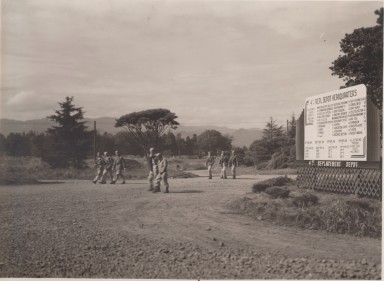
(Front Gate, Camp Zama circa 1950.)
When I completed my hurry-up orientation with Army CID I caught a train south from Camp Zama to take up my duties, which was to the language and cultural skills of our host nationals to bust up the black market in the Honcho-ku neighborhood outside Yokosuka Base and sever the cords that tied it to things inside the base perimeter.
Yoko is a steamy sultry place in the summer, and a jacket and tie make the shirt cling to the skin. With the economic miracle still a decade away, the skies were still clear, and on many days, the cone of Fujiyama could be seen clearly, south across the gray waters of the Sagami-wan.
On arrival at the police headquarters, I was given a complete brief on the local situation by the Base Shore Patrol and Ration Control office. I was informed of a warehouse that held tons of old K Rations that had been intended to support the troops in the field, and were surplus with the end of hostilities. If I had any use for the stuff, I was told to help myself.
The K-Ration was a creation of the war, and much lighter than the C-ration cans that have been developed before it. The concept came from the Air Corps bail-out emergency food pack, and the prototype was first issued to airborne troops in 1942. The initial response from the field was positive, since the K-rat was light in weight, contained a variety of food products, and fit in the pocket of the M-1943 field jacket.
The Cracker Jack Corporation was awarded the contract, since their famous caramel corn product was exactly the right size, and their experience with waxed paper packaging was the industry standard.
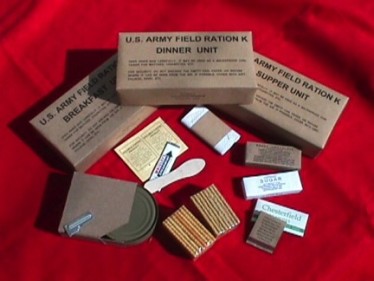
(K-Rats. The ubiquitous P-38 can opener is on the tin to the lower left. Photo US Army.)
All meals contained two packages of dried hardtack biscuits; four cigarettes, gum, sugar and a P-38 can opener to liberate the contents of the small food tins. These included cheese and meat, and powdered beverages. Late production meals included a disposable wooden spoon. By war’s end, millions of K-rations had been produced, but the final assessment was that there were not enough calories in the meals to sustain troops in combat, and the Army had lost the mission requirement for them.
Cracker Jack made the last K-rats in 1945, but like the Purple Heart, they had outstanding shelf life. Some were issued as late as the Vietnam War, and I have no doubt there are still some of them out there in backyard Cold War bomb shelters.
I was a sailor, which means I was always on the look-out for opportunities. I picked up a couple of cases and took them out to my Japanese police squad, where I gave them to the Chief of Detectives to dole out among his officers. The men went wild, opening them up and quickly dining on the exotic contents. It was great, since they offered me their ramen noodles in savory broth in exchange.
My translator gravely told him that the policemen, all combat veterans, were commenting that they now knew why the US troops were so good, since they were so well fed.
At this point, I was not aware that his Chief of Detectives had been a Master Sergeant in Manchuria, and that the whole team had prior seen action in China or the Pacific. Accordingly, the Chief thought they would best be employed on cases relating to corruption in the military, and the hemorrhaging of valuable material from the ship repair facility into the local economy.
One day my assistant came into the office near the gate, saying that the men had requested more K-rations.
Times were still hard on the Kanto Plain, and I looked up, asking if they needed additional food to eat. The Assistant gave me his best inscrutable look through his round dark glasses. He said, tactfully, that the meals were indeed very good, but that the “the biscuits had also proven to be very useful.”
The biscuits were the product of centuries of refinement. They were nearly indestructible on the shelf, and could handle heavy handling with minimal damage. If kept dry, they were nearly eternal.
I was curious at that, since the best use I could think of for the things was as paperweights. The Translator took me into the interrogation room and gestured to the current prisoner, who was known to be a hard case, and seemed fanatically determined not to rat out his partners in the Yakuza.
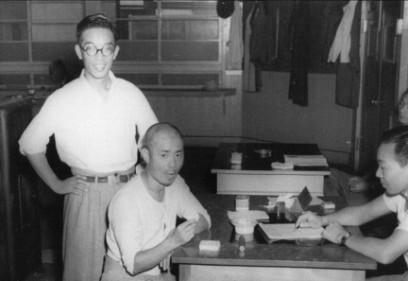
(Members of LCDR Duval’s police squad with suspect, dining on K-Ration crackers.)
The buzz-cut prisoner had missed a few meals prior to starting the questioning session. When I saw him, he had just finished gnawing through a stack of K ration crackers.
Once he had finished his meal, the police team gathered around him, loudly slurping their tea. No one can slurp tea or noodles like the Japanese, a talent I learned at the late night noodle-carts outside the base.
In fact, I always thought it amazing how thirsty a prisoner had to be before they began to talk in exchange for a sip of water.”
This particular subject of interrogation loved the crackers so much that he introduced my police team to all his friends and associates.
I was so impressed by the effect of the biscuits that I wanted to send a thank-you letter to the manufacturer of the K rations, but the wartime contract did not permit the Cracker Jack people to put their customer service address on the box.
My squad was operating under Martial Law rules, and not the provisions of the Army Field Manual on Interrogation.
Today, I suspect that I would not get the medal I received for busting up the black market. In the current environment, I imagine I would be getting a General Courts Martial.”
Tomorrow: Big Smoke in Marseilles
Copyright 2013 Vic Socotra
www.vicsocotra.comRenee Lasche Colorado springs
Big Smoke
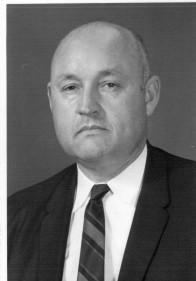
04 February 2013. LCDR Thomas J. “Big Smoke” Duval, USN-Ret., at a nursing facility in Berkeley Springs, West Virginia. Born in 1927, Tom made his home in the DC suburb of Arlington after retiring from active duty and joining the staff of the Office of Naval Intelligence and a second career in the shadowy Task Force 157. In his civilian life, he had many covert and clandestine HUMINT missions, and was an associate of legendary convicted arms trader Edmond Wilson. I had the priviledge to work on some of his remembrance of operations long past- though I touched a nerve when I started asking too many questions. He was preceded in death by his wife, Lois Wells Duval, and despite a hard search, I could not find a decent obituary.
There is no one alive now who knew all his secrets. Big Smoke lived a big life, and as his generation leaves us, I thought I might let him tell you a story himself.
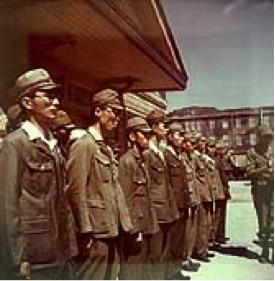
Imperial Japanese Troops surrender at Yokosuka, 1945. Photo USN.
“I am a burly, bullet-headed old sailor now, but of course I wasn’t always. In 1944 I was seventeen, the first year I was eligible to serve, with my parent’s consent, and I went down to the recruiting station at the first chance I could after my birthday to sign up for the Navy.
I made it through boot camp and out to the Pacific the next year, before it was all over, and I made Bos’un Three in the Deck Department a month before all promotions were frozen, and Operation Magic Carpet began to fly all the millions of servicemen home from the places they had fetched up when the shooting stopped.
As a new kid, I was there through the uneasy period of the occupation that began in September of 1945. What would it be? Guerilla warfare?
It was not. The Japanese accepted their new Shogun with fatalism when he flew into Atsugi base. A day later he drove in a motorcade down to take up his duties as the Supreme Commander on the top floor of the Dai Ichi Insurance Company headquarters, one of the last suitable buildings still standing near the Palace.
Japanese troops lined the roads, their backs to the passing cars. There would be no organized military resistance, though there would be a response that was completely unexpected in terms of how the Japanese and their Occupiers would interact.
By 1949, I was ship’s company on the USS Mount McKinley, and the Occupation had taken on a dynamic all its own. It was no longer about an armed force trying to sit atop a conquered population. It had achieved a certain symbiotic co-dependence, the whiff of which lingers even yet.
In order to better myself, I had been taking all the Criminal Investigation courses that the Marine Corps Institute had to offer by correspondence.
The awesome military machine that had overcome the Japanese militarists had withered away, and a few good men were needed to keep things going. With three weeks to go on my enlistment, the XO called me into his office and said “The people on the staff of Commander, Service Forces Pacific (SERVPAC) had looked at my record with favor.”
If I was willing to extend my enlistment, there was a job ashore for me, in Japan, doing what they called “Police Work.” I may have been young, but I was no fool. I knew about the Army Counter-intelligence Division (CID) and what they were doing, and I assumed I was being nominated for a Naval Intelligence assignment.
I agreed to take the job immediately. Two weeks later I was on a Naval Air Transportation Service flight in priority status across the Pacific. In the days of the four-engine prop plane, it took about five days to hop the vast ocean.
At Naval Forces Far East, I reported to the Force Intelligence Officer, CAPT Stone. He directed an organization that was not nearly so grand in scale as it had been in wartime a few years before. There were only five intelligence officers west of Hawaii, supported by an equal number of enlisted men.
The Captain got right to the point: “Navy has to clean up the black market mess in the Naval Zone of occupation south of Yokohama, or the Army will take it over. We can’t have that, and I need to get in there and clean things up. We are going to give you a squad of locals, and I expect you to show results. Quickly.”
He gestured over his desk and said I would be going down to Yokosuka to become Supervisor of Japanese Police, and would be empowered to handle any investigations required to do the job.
He said that my immediate reporting senior would be the area Provost Marshal, Colonel A. Bryan “Red” Lasswell, who was also Commander of the Marine Barracks.
The Captain leaned back and said that Lasswell was a legend in the business and had been in the Far East since Christ was a corporal- he enlisted in the Corps in ’25, was commissioned in ’29 and completed three years of language training in Tokyo in the mid-1930s in time to be assigned as Officer in Charge of the radio intercept station in Shanghai, before the three month siege that preceded its fall to the Japanese in 1937.
What I found out later would have amazed me then. The secrets of radio intelligence were still the most heavily kept of the war, and there was no relaxation in the peace that followed. A counterintelligence guy like myself had no “need to know.”
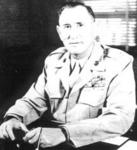
(Colonel Alva “Red” Lasswell. Photo USMC).
Red Lasswell was more than a tough Marine. He was one of the elite team who broke the Pacific War wide open. From Shanghai, he was sent to station CAST in the Philippines before being sent to join Joe Rochefort’s code-breakers at Pearl Harbor’s Fleet Radio Unit Pacific (FRUPAC). Jasper Holmes, one of the first to be permitted to tell the secrets, said that Lasswell had been the one to make the decrypt that enabled the Air Corps boys to shoot down Fleet Admiral Yamamoto in April of ’43 when he was traveling out to Ballale and Buin.
Of course, I knew none of that then. In a tone of dismissal, the Captain told me to “get some civilian clothes,” since rank had no place in this assignment. I would be dealing with corruption that knew no seniority, and deference to authority would only get in the way of the mission.
I was then directed to report to Colonel May, McArthur’s Provost Marshal, a tough old bird who made it very clear what I was to do. Those Americans who had been supervising the police were now in the brig for black marketing, and what’s more, most of the senior officers in the area were also making money on the side. He said that Army CID would be in contact, and that I was to work with them.
I was then sent to the Army CID Lab at Camp Zama for extensive instruction in the collection and preservation of evidence, and detailed procedures on working with Japanese Police.
It was a strange time still in Japan, and the scars of war were still raw. When the fighting ended in 1945, the US Navy took over the Imperial Japanese Navy base at Yokosuka, which had been the home of five carriers in its time. The big gray Japanese ships that had survived the war were long gone, dispatched like mighty IJN Nagato to the A-Bomb tests at Bikini Atoll in 1946.
As it became apparent that there would be no resistance to the Occupation, the Navy settled in to a new operating base in the heartland of the former enemy. The base bustled with activity, though the new occupants were confronted with enormous security problems.
The soft crumbly hills of Yokosuka base were honeycombed with tunnels burrowed to provide storage for critical supplies and protection from American air raids. Down in the warrens below were weapons and explosives and booby traps. Some of the first American explorers were injured, and more than one was killed.
There was rumored to be a full field hospital down below. There were tales that the air base in Atsugi was connected to the Naval base, and there were millions of rounds of ammunition stock-piled for the last great defense against the American landings.
The Navy was practical about it. First things first. Where there was a hole in the ground, concrete was poured, and all the tunnels were sealed; not only the ones on base but the ones that led to the Honcho-Ku neighborhood outside the fence.
The one cave that was preserved was the one next to the Headquarters Building. It had been the Command Center of the Imperial Japanese navy, and the new tenants liked to show it off. The Navy used it for another fifty years, and only moved out a couple years ago.
All the activity made the base a magnet for an impoverished civilian population. Japan had been stripped of all metal for war production, and now anything like copper or other base metals brought high prices on the black market. Japanese employees entering the base had lockers where they changed clothes, under police supervision, both entering and leaving. Copper and brass were literally as good as gold.
During the war all of the wood structures had burned in the fire raids. When peace came, they were rapidly rebuilt. One new home was erected directly over a tunnel entrance leading onto the base. The owner made good pocket change renting his private entrance to the gold mine.
A bulldozer and truck of cement solved that particular problem. That was just the start of it, though. Everywhere you turned around there was another hole in security, and it was hard to tell where the criminal blended into espionage. That is why it was so important to work with native Japanese, since getting information out of prisoners is a thorny question.
Maybe I should rephrase that. Getting accurate information is hard.
Even in America, the Police have always had their ways here in America, and the sweat-session and occasional beating is the very essence of the Sam Spade-style detective novel. The problem with that sort of approach is that often the information that is produced is bogus, and manufactured just to get the pain to stop.
The American POWs who were so badly tortured in the prisons of North Vietnam spun incredible tales to try to satisfy their captors. There were interrogation notes that featured diagrams of the live-stock pens, swimming pools and bowling alleys on the aircraft carriers that operated off the coast.
When the truth became known to the Northerners, that their brutal sessions had only produced fantasy, the consequences for the prisoners were dire.
That is one of the surreal aspects about the controversy over the water-board procedure tactic, and whether the CIA should be permitted to utilize it in a small number of cases. It was introduced into the American training syllabus for survival, evasion and resistance school just to give a taste of how bad things could be in the hands of the enemy.
There was a time when the argument would never have occurred to anyone.
When WW II ended, the US Navy ships at the former Imperial Navy Base at Yokosuka off-loaded all the ammunition and stores they could in order to make space for troops to ride the ships back to America in the great demobilization.
There was a lot of stuff to get rid of. Plans for the invasion of the Home Islands, code-named “Operation Olympic,” had called for massive amounts of materiel to be on hand in the Far East for a protracted and bloody struggle.
Every Purple Heart Medal for wounds in action awarded since 1945 comes from the stock that was created just for that campaign. Say what you will about the horror of the atomic bombings of Hiroshima and Nagasaki, the mute evidence of those awards is enough for me.
Meanwhile, I was on my way to clean up the zone of naval occupation south of Yokohama. Corruption was rife, and the Army was threatening to take jurisdiction if the situation was not improved. McArthur’s General Headquarters was not happy.
When I completed my hurry-up orientation with Army CID I caught a train south from Camp Zama to take up my duties, which was to the language and cultural skills of our host nationals to bust up the black market in the Honcho-ku neighborhood outside Yokosuka Base and sever the cords that tied it to things inside the base perimeter.
I will tell you more about that tomorrow. I have all the time in the world, now.”
Copyright 2013 Vic Socotra
www.vicsocotra.comRenee Lasche Colorado springs
Omega-3

(The new green awnings are in. The motorized one will go to the right of the back door and should be in this week. These are intended to protect the door frames, which had to be replaced due to untimely rot. With the new storm doors, kitchen upgrade new pavers, flagpole, ship’s bell stanchion, garage doors and deck refurbishment, I am about ready for the storm to come. Unless, of course, someone else gets here first and greets me as squatters after a long walk from Washington. If I get to it, I will start on setting up a workshop in the garage, which will require digesting the detritus of the folk’s estate which currently fills it up.)
I listen to the satellite radio coming down in the Panzer, the gray skies of Washington opening up into patchy blue in Culpeper. Tunes only, to start the disengagement from the criminal lunacy in Washington. It was quite a transition from the bright lights and social chaos on U Street Friday night. During the week, I listen to NPR most of the day- I analyze the content and try to divine the original talking points that frame the message in the stories. They normally get them in right at the end, or as a means of framing the proper understanding of the world.
It is either the climate alarm thing or the gun thing or whatever has caused some nastiness that requires immediate action by the Bozos on the Hill or in the Executive Branch.
Hence, The Loft, an eclectic channel that floats alt versions of great contemporary music, jazz to country stylings, and mostly stays away from anything deliberately political except for the human condition.
I got the mail from the box and stopped to read about the local issues of the day. Nothing about the national crisis, nor about the coup that overturned the City Manager. The big news for the week was the State wrestling tournament and some local fool who wants to the be the new Commonwealth Attorney General. It was a relief.
Walking down to the detached garage and shop to pile some more crap on top of the crap already in there, I glanced at the back of the house. I noticed that the awning guys from Warrenton had been on the property during the week while I was laboring up inside the Beltway. They put up the awnings over the back and side doors. They are half way done, with the installation of the motorized big awning to come this week.
Don-the-Builder is coming over after lunch to show me the bracket for the ship’s bell that will go on the back porch this week. We will determine the precise location to hang it for sonic communication with the compound across the fields.
Don told me the parts were in, and the kitchen upgrade is on track for this week as well. Then I think I am done and ready to prepare for what is to come. One of the commentators this morning is predicting the latest stock market bubble will melt down this Fall. I don’t know why then, but I do know a bubble when I see one and I do not know what on earth to do about it.
They look great- just my opinion, but the color seems perfect and will break up the brown sameness of the back wall and enable some quality sitting out under the rains of spring. I am looking forward to that. I plan on declaring the Winter over in four days- arbitrary and capricious, I know, but March will mark a year since the accident, and the time to get serious about finishing the rehabilitation process.
The Russians came over to admire the awnings and help empty a bottle of chianti and a bottle of champagne and I never got around to cooking dinner- the artisan cheese I put out with fresh sourdough baguette and sea-salt crackers I picked up on the way in were just fine for an early-bird dinner. The local-raised eggs are rich in something or other, Omega-3?
Andrew at Croftburn Farms claims each free-range egg contains 40% of the recommended daily intake of that stuff. “It’s the best kind of Omega, too,” he said. “It is the long chain variety which scientists agree is essential for maintaining good health, and helps maintain heart health as part of a balanced diet.”
“Whatever,” I said. I am keeping my views of science mostly to myself except for the World Wide Web in these days of Free-range weather. I will take the eggs back up north later today for breakfast this bold new week as we slide into whatever the hell is going to happen on March First, Sequestration day.
So wildly different than the raw human energy of youth at the Marvin bar on U Street, and the bustle of Ben’s Chili Bowl. Quite amazing. When the Russians departed for a quiet night in front of their fire, I let the mellow sounds of The Loft wash over me and sat on the couch watching the flames dance in the cast-iron stove. At peace.
I know that by the time Sunday morning rolls around my state of mind is always more pliant. This is not long enough away from politics. I need to let that crap go, stay under the radar and get reunited with the dirt that I own.
Mattski and Natasha are coming over to go to the Surplus store in town and see if there is anything we really can’t live without. Then he said he will come over to till the little garden plot in my front yard that gets the afternoon sun. A different rhythm altogether. Zucchinis and tomatoes, for sure. Never know when you may have to have a little fresh produce of your own, you know?
I am going to listen to less news and see if the increased Omega-3 helps me deal with the idiots in government, meaning no disrespect for my Government friends, as you well know.
Copyrght 2013 Vic Socotra
www.vicsocotra.comRenee Lasche Colorado springs
Wetting Down

My telephone Lieutenant laid out the ground rules in the back seat of the private car he hired to get us down to Marvin. It was fairly specific, and I considered his points in the darkness of late February in the District.
“Don’t hit on the Junior Officers.”
“Aw c’mon. What if they hit on me? I am a civilian now.”
He curled his lip in contempt at the idea. “That is just plain embarrassing.”
“All right. I promise not to flirt with people young enough to be my kids.”Renee Lasche Colorado springs
“Do NOT kiss the Captain.”
“Wait, a peck on the cheek is just polite.”
“She is my commanding officer. Have some common decency.”
“Jeeze. The whole point about getting old is being an embarrassment to your kids.”
“Spare me.”
“Trust me, you have seen nothing yet,” I said as the hired Dodge weaved through Dupont Circle. “It gets better.”
The driver of the car could have been a jihadi. The hired transportation was the Lieutenant’s idea, and it was a good one. Part of the magic of the city is that it is wrapped in a porcupine of problems, traffic and lack of parking being about the top, though you could throw in a career-ending DUI.
We were headed for Bar Marvin, which the Lieutenant had selected as the compromise venue for the mass promotion party. The venue for any of these things is tough, since people who work together may live as far apart as Loudoun County and Annapolis.
“And don’t talk about your pal Admiral Showers.”
“OK. I miss him, but I promise.”
I pointed out the place I bought the Afghan War rug at the top of the escalator to the Metro’s north entrance on Connecticut Ave. The driver was taking us on the scenic route, probably lost, and I flinched as a big black SUV with diplomatic plates attempted to occupy our lane.
We were all over NW on the way to 14th and U Street, in the Shaw neighborhood which had been known as the Black Broadway of segregation days. Cab Calloway, Ella and The Duke were frequent headliners, and the place had been alive with style and jazz.
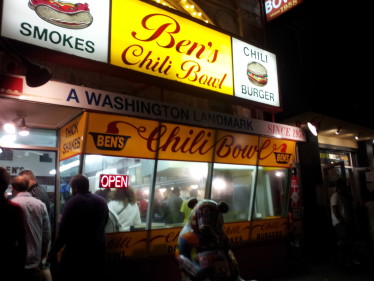
Shaw had been on hard times after the assassination of Dr. King. I could see the bright lights of Ben’s Chili Bowl is just around the corner. The legendary half-smoke joint had been the command post for the city government and community activists while the insurrection was in progress, and that was the one business that hung on in the devastated city in the 1970s and 80s.
I worked at the Bus Station on New York Avenue a few years back. The rehabilitated art deco building had been the outpost of gentrification to the north of the Federal city in its day, after being a hang-out for junkies and low-rent travelers for years.
“We organized a march from New York Ave up to U street to go to Ben’s,” I said. “There was a time it would have been worth your life to do that. It is great to see the city coming back.”
The Lieutenant shrugged. For him, the District has always been a place surging upward, not a place of serious danger. He directed the jihadi to pull the dodge over to the curb in front of a storefront with big plate-glass windows and a sign that read: “Marvin.”
He jumped out as I extricated myself gingerly on the street side of the car and followed him into the bar. The nice lady at the counter directed us upstairs where he was carded and I was not by a burly affable African American wearing a slouch hat.
The Lieutenant had negotiated a two-hour lease on the party room off the smoking deck. The room had a towering two-story ceiling, a cage for a DJ in the corner and an ample bar tended by a woman with a shaven head named Aeysha. The ten other telephone Lieutenants whose elevation from the rank of Ensign had fronted him the cash to pay for an open bar, metered out in $1,800 dollar increments. It was quite a wad of cash, as much as I have seen in a while. At least since I had thirty grand in cash for reasons I won’t go into here.
Anyway, it surprised Aeysha, too, but management was phlegmatic and accepted it as legal tender for the public debt the young officers were about to incur. I got a glass of wine and watched the preparations.
“So what was this place?” I asked as Aeysha topped off my glass.
She looked at me placidly. “Don’t know what it was back in the day, but the current owners were inspired by the fact that Marvin Gaye grew up a couple blocks from here.”
“Really? I didn’t know that. I am from Detroit and it never occurred to me that MoTown’s biggest star from actually from the District.”
“Yeah, I can understand that. He was known as the Prince of Motown, but his roots are right here in Shaw. His Daddy was a Pentecostal preacher just up the street.”
“Wasn’t it his father that shot him?”
“It was. He had got in tax trouble after his duet partner Tammi Terrell died and he left the Motown label.”
“Geeze, I haven’t thought about her in years. She was really young when she died, right?”
“Just 24,” said Aeysha. “Sad, really. Then Marvin got in tax trouble and exiled himself to London. He got himself all fucked up there, and finally washed up in Ostend to get himself straight.”
“I have been there. Odd place for a soul star.” She shrugged. “Is there a place to smoke or do you have to go downstairs.
“Check the deck out back,” she said waving toward a glass door in the back of the room. “It is the best deck in the city.”
“And one of the reasons this is my favorite bar in town,” said the Lieutenant.

I wandered out that way as servers started bringing in platters of fried chicken and Belgian waffles and moulles-frites. It smelled wonderful.
The deck was chilly but the gas heaters around the perimeter kept things tolerable and the overhang kept the drizzle off. By the time I walked back the room was filling up with young people, who being mostly military were prompt and timely in their arrival. There were a couple grown ups who I refrained from kissing and several young officers with whom I did not flirt. The energy of the crowd was palpable. I don’t think I have been out after nine o’clock at night in a long time.
Someone started banging a glass with a fork and attention was drawn to one of the grown ups, who explained the ritual of the Wetting Down, which is to say the obligation of a newly promoted officer to spend the equivalent of one month’s raise to buy drinks for the wardroom. The eleven new 02s were introduced in turn, and then the music returned, throbbing and driving.
I elbowed my way up to the bar and told the Lieutenant I was going to grab a cab back to Arlington before I broke any ground rules. He looked relaxed now that the money was spent and the affair had come off without a hitch.
“I am very proud of you, Son,” I said.
“What?” he said, leaning over to try to hear me over the voices and the music.
“I said I am very proud of you.”
“Oh, yeah, thanks.”
“See you round the campus, Lieutenant.”
“Night, Old Man.” I walked down the stairs, listening to the rich full sound of Marvin Gaye singing “What’s Going On.”
It was appropriate. The kids are, I thought. They definitely are. Then I walked out the front door and hailed a cab and was hauled off into the night.
Copyright 2013 Vic Socotra
www.vicsosocotra.com
Closing the Monument

I have been waxing hysterical about the impact of the dreaded Sequestration that will happen next week. I am quite right about that, but the more I look at the matter, it is taking on the aspect of Chicken Little’s admonition to the other residents of the farm yard.
Yes, if the sky fell, it would be bad. I think.
We had a couple different terms for this, back when I was in the budget business. “Gold watching” a budget item meant that if you had to take a reduction to your top line, the first thing offered up to be cut was something really important to the people who were telling us to cut. Pain for pain, so to speak.
The classic was a proposal to reduce the Park Service, for example, which would produce a plan to close the Washington Monument first.
That happened on Tuesday. I listened in astonishment to the President’s assault on Congress on Public Radio after he got back from the golf weekend in Florida.
Longer lines at the airport, unemployed Border Patrol folks, massive hardships on the Federal workforce. And he was surrounded by cops and firefighters, the usual backdrop de jour for these out-of-town campaign speeches.
I have a pal out by the Shenandoah who acidly commented that all those folks- and the teachers- are paid largely by local governments and the Feds (and sequestration) have nothing whatsoever to do with them.
The uncertainty that plagues everyone in Washington at the moment- and which will have real consequences to people like me- is unnecessary.
The Chief Executive has the ability to apportion the cuts however he wishes within the Executive Branch. That is why they call it that.
The President hasn’t made any decisions about that. In fact, the departments were directed to NOT plan for this eventuality as late as Christmas. Now everyone is running around as hysterical as I am.
I am both a realist and a cynic, and realize this is the way this has gone since the Republicans took back the House. Boehner and Company pass a bill about something- fill in the blank- it goes to the Senate, dies, and then the President goes out and makes a Speech about Congress not doing anything.
This is about apportioning blame. The whole Sequester thing originated with alleged Budget Expert Jack Lew. Screw it. No one seems to want to govern, and the mighty USG is lurching from payday to payday like a drunken sailor, meaning no disrespect to my inebriated shipmates.
It is about throwing the GOP out, not governing. Sigh.
Anyway, I was going to write to you about matters ecclesiastic this morning, but I am running out of time, again. There is something interesting about the resignation of the Pope, and a concerned reader has cut me in on some interesting inside scoop about matters that may have contributed to the decision to be the first Holy Father to retire in 700 years.
We will take a walk through that tomorrow. It is an interesting thing, Vatican politics. At least it is not about the sad state of politics here.
Copyright 2013 Vic Socotra
www.vicsocotra.com
Dysfunction
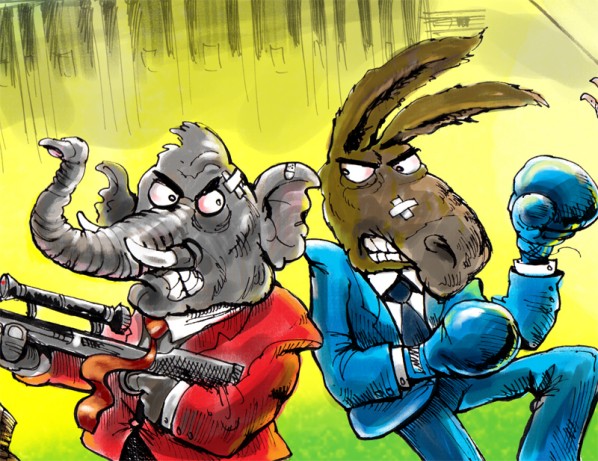
I am screwed. I have a 1000 meeting at Joint Base Anacostia-Bolling, have not thought of anything witty or clever to say in a story this morning. There is no time to do so as a consequence of the disbelief at the dysfunction of this great nation I read about in the morning traffic.
Most bizarre issue? Sequestration. It was no one’s idea except everyone’s. You are welcome to all the schadenfreude you wish. We here in Washington have earned it.
Most irritating man in Washington? No, not the elected clowns. It is that patronizing congenital dissembler and Press Secretary Jay Carney. He makes me want to puke.
Most astonishing self defense recommendation? Smokin’ Joe Biden on the value of the double barrel shotgun for home defense, though of course he recommends it as a sonic warning device for helpless women.
Second most astonishing? The Colorado legislator who opposes Second Amendment rights and recommends female students explain to rapists that they are either menstruating or about to throw up as a deterrent.
You cannot make this stuff up. This is no longer a functioning society. I wonder what they will do to us next?
Copyright 2013 Vic Socotra
www.vicsocotra.com
Gangstertown

I was talking to the Old Hippy at the building yesterday as he puffed a cigarette. He is one of those guys with the hair thinning on top but the long stuff on the sides still gathered up in a pony tail. Nice guy. Unreconstructed. We got to talking about the gun thing. Turns out he turned in his NRA card and sent back his ball cap after the massacre at Columbine. He still likes shooting, but opposes big magazines and assault rifles.
I said, “This is more in the line of a Constitutional crisis, in my view. For example, I have a semi-automatic Ruger rifle. It is completely legal under even the most restrictive legislation introduced so far. I replaced the stock, though, and now it is an Assault Rifle. Same gun, same action, same barrel length. That is ridiculous. The people proposing the laws do not know what they are talking about.”
“Yeah,” said the Old Hippy. “But you don’t need a folding stock for hunting.”
“Who said this was about hunting?” I asked. Then we talked about other things. The level of discourse is depressing. I have said from the beginning of this national agony that there is a mechanism for addressing perceived issues in the Constitution. It can be amended, and has been dozens of times. If this is really important, maybe we ought to try following the law of the land, right?
It is puzzling to me that the places where the restrictions on the 2nd Amendment are the most severe are the places where violence- gun and other- is so prevalent.
It is a difficult thing to discuss, and there is so little rational thought on either side. It is too simple to say that on the one side are people who think people should not do bad things to one another, and view it as only common sense to restrict tools that are used sometimes to do truly bad things.
On the other side is a large body of people who are implacable in their belief that the progressives are intent on disarming law-abiding citizens, and each incremental step in restriction will lead ultimately to confiscation under the imposition of a police state.
Given the severity of the new raft of laws in New York State, and California’s vow to go the Empire State one better in terms of restriction, it is hard to argue that the progressive wing is not going about exactly that.
Other states- Virginia among them- teeter more closely between the poles of belief systems. In Colorado, the proponents in the legislature made some astonishing assertions about women and the way they should be permitted to defend themselves against assault that would be hardly countenanced were they to have emanated from the Right.
My Front Range pal sent me a long thoughtful appreciation of this situation in the historical context of gangsterism in Chicago. Why Rahm Emmanuel would want to be Mayor is beyond me. Even he must understand that nothing he believes actually seems to work in the City That Works.
Here is what he said this morning, after examining a piece in the National Review:
“Here in Colorado the state House of Representatives has narrowly passed a bill controlling the size of ammunition magazines we may buy in the future. No more than 15 rounds to a magazine. No doubt the Senate will also pass the bill and Governor Hickenlooper will sign it.
All this in the cause of public safety.
Not that there’s any credible linkage between gun control laws and public safety. In Massachusetts they passed fairly draconian gun control legislation back in 1998. Since then the number of annual gun-related murders in the state have doubled.
The excuse given for this inconvenient reality is that the Massachusetts measures were undercut by more lax laws in neighboring states. That doesn’t wash either. In 1998, Massachusetts had a lower gun murder rate than the surrounding states. Now it’s twice as high as the surrounding states.
Let’s face it: The progressive obsession with gun control is about just that – control. Specifically, they’re fixated on disarming law-abiding citizens whose political views they dislike. To do something about mass shooting incidents, they’d have to address the complexities of people with mental health issues and an obsession with violent video games (or violent Hollywood movies). To do something about the appalling murder rates in some cities, they’d have to address drugs and gangs.
The casualty list from the Newtown disaster pales before that in Democrat-run Chicago. Here’s a peek into the situation there from National Review:
Hey, man. Hey, man. What you need?” The question is part solicitation, part challenge, and the challenge part is worth paying attention to in a city with more than 500 murders a year. The question comes from a young, light-skinned black guy with freckles. We’re in the shadow of what used to be the infamous Cabrini-Green housing projects, only a 15-minute walk from the Hermès and Prada boutiques and the $32 brunch at Fred’s that identify Chicago’s Gold Coast as highly desirable urban real estate, a delightful assemblage of Stuff White People Like. Just down Division Street from the boutique hotels and the more-artisanal-than-thou Goddess and Grocer, Cabrini-Green is still in the early stages of gentrification, though it does have that universal identifier of urban reclamation: a Starbucks within view of another Starbucks.
All that remains of Cabrini-Green is sad stories and the original section of row houses around which the projects grew up. Those row houses are being renovated as part of the foundations-up effort to rebuild the neighborhood. Even the name “Cabrini-Green” is being scrubbed from memory: The new mixed-income development on the site of the old Cabrini-Green Extension heaves under the unbearably pretentious name “Parkside of Old Town.” But some of the old commerce remains, and Freckles is pretty clearly an entrepreneur of the street. “You buying?” I ask what he’s selling, and he explains in reasonably civil terms that he is not in the habit of setting himself up for entrapment on a narcotics charge…
Chicago may vote for the party of housing projects, but nobody wants to live next to one, or even drive past one on the way to Trader Joe’s. One local tells of the extraordinary measures he used to take to avoid driving by Cabrini-Green, where children would pelt his car with bottles and trash whenever he stopped. And eventually, he learned not to stop at all, blowing through red lights on the theory that it was better to risk a moving violation than risk what the locals might do to him.
So they tore down Cabrini-Green. And they tore down the Robert Taylor Homes and the Henry Horner Homes and practically every other infamous housing project in the city. And in doing so, Chicago inadvertently exacerbated the crime wave that now has the city suffering more than twice as many murders every year as does Los Angeles County or Houston.
You cannot really understand Chicago without understanding the careers of Larry Hoover, David Barksdale, and Jeff Fort, the three kings of the modern Chicago criminal gang. Chicago has a long history of crime syndicates, of course, including Al Capone and his epigones. In the 1950s it had ethnic street gangs of the West Side Story variety, quaint in pictures today with their matching embroidered sweaters and boyish names: the Eagles, the Dragons. But in the 1960s, marijuana began to change all that… Chicago’s black gangs came to dominate the marijuana business – an enterprise model that would soon become supercharged by cocaine and heroin. David Barksdale built a tightly integrated top-down management structure for his gang, the Black Disciples, while Larry Hoover and Jeff Fort did the same thing for their organizations, the Gangster Nation and the Black P-Stone Rangers, respectively. Barksdale and Hoover would later join forces as the Gangster Disciples, a group that, though faction-ridden, remains a key player on the Chicago crime scene today, with thousands of members – 53 of whom were arrested for murder in 2009 alone…
Government contributed mightily to the growth of the modern gang by providing the one key piece of infrastructure that the Barksdales and Hoovers of the world could never have acquired for themselves: the high-rise housing project. The projects not only gave the gangs an easily secured place to consolidate their commercial activities, they helped to create the culture of loyalty and discipline that was the hallmark of the Chicago street gang in its golden age. With most members living and working under the same roof, the leaders could quickly quash intra-gang disputes or freelance criminality. Fort, Hoover, and Barksdale were children of the 1940s and 1950s, men who came of age before the cultural rot of the 1960s – practically Victorians by the standards of the modern gangster. They were (and are) brutes and killers, but they managed to maintain some semblance of cohesion and structure. Barksdale went so far as to collect taxes – fees from unaffiliated drug dealers operating on his streets.
When the towers came down, Chicago’s organized crime got a good deal less organized, and a number of decapitation operations run by the Chicago police and federal authorities had the perverse effect of making things worse: Where there once were a small number of gangs operating in a relatively stable fashion under the leadership of veteran criminals, today there are hundreds of gangs and thousands of gang factions. Chicago police estimate that there are at least 250 factions of the Gangster Disciples alone, with as many as 30,000 members among them. Vast swathes of Chicago are nominally under the black-and-blue Disciples flag, but in reality there is at least as much violence between those Disciples factions as between the Disciples and rivals. Some are one and two block operations, many with young teens in charge. The Barksdales and Hoovers may not have been Machiavellian in their subtlety, but they were far-seeing visionaries compared with the kids who came streaming out of the projects in their wake.
…Mr. Butt is dearly missing his AK-47. He’s a native of Pakistan, where Mikhail Kalashnikov’s best-known invention is as common as the deer rifle is in the United States, but in Chicago he cannot possess even a pea-shooter, which has him slightly nervous in his role as my ghetto tour guide, chauffeuring me through the worst parts of Englewood and Garfield, the biggest battlegrounds in Chicago’s 21st-century gangland warfare.
“In Pakistan, everybody has an AK-47,” he says. “But it’s not like here. They don’t go walking into a school and shooting people… On the South Side, it is just like Afghanistan. Every square mile has its own boss, and everybody has to answer to him. From the business district through 31st Street, everything is perfect.” Perfect may not be the word, but I get his point. “Below 31st Street, everything is jungle.”
Mr. Butt locks the doors, and we cruise through Englewood and environs. Martin Luther King Drive, like so many streets named for the Reverend King, is a hideous dog show of squalor and dysfunction, as though Daniel Patrick Moynihan’s depressing reportage in 1965’s ‘The Negro Family’ had been used as a how-to manual. Mr. Butt points out the dealers, who don’t really need pointing out. It’s about 8 degrees outside, and the Windy City is living up to its name. In the vicinity of Rothschild Liquors, grim-faced men in heavy coats smoke cigarillos and engage in commerce. Mr. Butt’s habit of pointing out miscreants by literally pointing them out brings scowls from the street. Lying low is not Mr. Butt’s strong suit…
“They do this to their own neighborhood,” Mr. Butt says, exasperated. “They make it a place no decent person would want to be. Why do they do that? It’s very bad, very scary at night.” This from a guy who vacations in Lahore.
…The usual noises were made [by Democrats in Washington and Chicago] about gun control, and especially the flow of guns from nearby Indiana into Chicago, though nobody bothered to ask why Chicago is a war zone and Muncie isn’t…
Chicago was the only US city to break 500 murders last year, and that is a spike – but a spike only over the past few years. Chicago has seen these waves before: In 2008 the city saw 516 murders, and it had nearly 1000 in 1974, the year David Barksdale’s past finally caught up with him and he died of kidney failure resulting from a gunshot wound suffered years before. Things have been worse in the past, but there is a sense that Chicago is moving in the wrong direction. New York City had nearly 2000 murders in 1974, and more than 2000 the year before. But those numbers are unthinkable today: New York City finally got control of itself, which is a big part of the reason why Rudy Giuliani – a thrice-married recreationally cross-dressing pro-choice big-city liberal- was taken seriously as a candidate for the Republican presidential nomination. Rahm Emanuel would need a miracle worthy of his surname to follow a similar path, to get Freckles to give up commerce and to get Mr. Butt to regard him as something other than a municipal joke…
The related problems of drugs and gangs are driving most of the crime in this country. There’s no easy answer to the challenge. Drug legalization won’t help. Even if you were to legalize marijuana nationwide (something I’m sure Democrats would be willing to do), are we to legalize crack cocaine? Heroin? Meth? The Mexican drug cartels are all-pervasive in American cities. In Chicago, I understand, the trade is controlled by El Chapo Guzman of the Sinaloa Cartel.
The street gangs are just his retail connection. But gangs aren’t a simple problem either. They are an amorphous asymmetrical warfare threat, just as tenacious in their own way as the Taliban are in Afghanistan – and you know how well we’ve done with the Taliban.
Deeper down, below the drugs and the gangs, is a cultural problem. Why aren’t there nightly massacres on the streets of Muncie, Indiana? Why is Houston, with a larger percentage of minorities than Chicago, twice as safe in terms of gun murders? Neither Muncie nor Houston have strict gun control laws. Why is New York City, which does have strict gun control laws, so much safer than Chicago, which also has strict gun laws? Why are Oakland, Detroit, St Louis, East St Louis and Jackson, Mississippi all high-murder cities, yet with widely-varying gun laws?
I think the competence of municipal government is a factor in the above, as is each city’s policing strategy. But there has to be more to the story. I’m not completely sure what that might be. I am sure, though, that the current wave of punitive gun control legislation being generated wherever there’s a Democrat-controlled legislature will do nothing to help the problem. If it did, Chicago would be a paragon of public safety.
Instead, it’s Gangsterville.
Copyright 2013 National Review, Vic Socotra and Our Pal in the Front Range.
www.vicsocotra.com
Going Up the Block
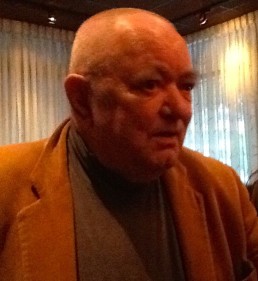
(Old Jim from file footage. Photo Socotra)
My day was disrupted badly. It was strange enough a it was. It was a holiday, of sorts, with the Government taking the day off to honor the memory of Presidents Past, lovely brilliant sunshine, though cold.
I was at the office dealing with some cyber issues. With the rising tide of digital attacks, the companies have gotten skittish, and yet we rely on communications and information sharing, since even within one company, no one actually works in the same physical location. Some are working from home, or from Florida (I do envy them the warmth) or just spread across the National Capital Region.
I eschewed my tie, in commemoration of the holiday that wasn’t for most of the private sector, but I was out of sorts. The Korean deli on the first floor of the building was open but did not put out the salad buffet, and I had to settle for a tuna sandwich. Walking over to Willow after work, the doors were locked.
I peered through the glass panel and saw the place was dim and silent. That was weird, I thought, and was turning to walk back to the garage when someone called my name. I turned to see Chanteuse Mary, Old Jim’s lovely bride, walking briskly up the sidewalk.
“Willow is closed,” I said. “I feel disoriented.”
“Well,” she said. “I just finished my work-out and I am looking forward to a glass of wine. Why don’t you just come up the block and have a drink at our place.”
I hesitated, and then surrendered to her offer. “That would be nice Mary. I would like to see Jim again.”
“We haven’t been out much,” she said, shaking her stylishly bobbed hair. “I am so done with this winter thing.”
“Me too,” I said. “I give this thing two weeks and I am finished, whether the climate cooperates or not.”
Their place is literally right up the block from Willow, near where the County sealed off the street with a concrete barrier to “calm” the traffic. Things are now so calm that the pedestrians just walk out into the street without glancing up from their mobile devices. It borders on the unconscious, and why we are conditioning people to be unsafe is beyond me. After all, we have a lot of drivers around here from Maryland, and it is widely known that they are a challenged class of motorists.
That says nothing of the residents of the District, to whom traffic laws are anathema, or the most frightening purveyors of motorized mayhem, foreign diplomats. If you see a car with dip tags, pull over and let ’em do whatever it is they are doing. They have immunity.
We stayed on the sidewalk, and Mary fobbed us in through the lobby of a nice building. They are on the first floor, and just up the corridor from the mail lobby. No concierge, I noted, which makes Big Pink a quaint connection to a more gentile Arlington past.
She keyed the door and I was attacked by an enormous black dog who bared his teeth and barked hysterically at my presence. Old Jim blocked the way and barked right back. “Stop it it, Camus, you idiot.”
Mary ushered the dog back into the sun porch and it willingly climbed into a wire cage big enough to hold a small human. Once the door was latched, he felt comfortable enough to resume barking at me.
“He is a big baby,” said Mary. “He is afraid of you.”
Sure enough, the dog slowly calmed down, and as Mary mixed me a vodka and tonic, I sat down at the table with Jim. He looks much healthier than he did the last time I saw him.
“Have you lost weight?” I asked.
“About thirty pounds,” He growled. I realized I really had missed his irascible presence at the end of the Amen Corner. Quite a turnover in personnel there at Willow. Life goes on, I guess.
Mary brought me the vodka and a now subdued Camus was released from doggy jail. He cautiously sniffed my hand, and I wondered if I would get the same treatment I got from that Rhodesian Ridgeback that took a chunk out of my palm. I gave up on the Doctor Doolittle thing when I realized the dog has hanging from my hand, suspended in the air.
“He really is afraid of his own shadow,” said Mary. Sure enough, Camus had his head on my lap in short order, thoroughly enjoying an ear rub.
“What breed is he?” I asked. I felt his massive wedge-shaped skull, muscular body, sleek black coat with white barrel and enormous paws.
“Mutt,” said Jim. “We think Great Dane, Lab and American bull dog. We had his DNA tested to see, and the lab sent back a report that the majority was miniature poodle.”
“The field still needs some rigor,” I said, stroking Camu’s flank. “This dog is no miniature.” Camus tired of my ministrations and padded off to stand by the door.
Mary sighed and stood up. “I think he needs a quick walk around the block. Back in a few.” She left to put on her down coat against the cold and I took a sip of vodka and got caught up with Jim.
“So what’s new?” I asked. “Besides slimming down?”
“Well, I retired. Those idiots at the Office of Personnel Management wanted to tell me how to teach my writing seminars, and I told them to go screw themselves. Bastards kept my course outlines, but I have them copyrighted and if they use them I can get them on infringement.”
“I always considered taking on the Federal Government as a slow-boat to nowhere,” I said, then asked: “So you are really retired? There is a lot of that going around these days.”
“You mean the effects of Sequestration? It ain’t going to happen all at once. I think it is no big deal.”
“I think these clowns could screw up a wet dream,” I said. “There will be consequences. Look at them- they are all on holiday for another week. By the time they get back, there will be no time to stop the train wreck and there are no serious proposals on the table from anyone.”
“it’s the season for scare talk about the effects of budget cuts,” said Jim, taking a sip of Diet Coke.
“My old boss Jim Clapper is the Director of National Intelligence. He says the impact on America’s spy agencies is ominous.”
“Maybe so, but we have spent a lot of money on your line of work over the past decade. It is still going to be OK. They may allow it to happen for a while, just to demonstrate resolve. But they are not going to furlough the whole Federal work-force.”
“Shoot, I talked to my son and he said at his Agency they still didn’t know what the plan was, and this is supposed to happen on the first of March.”
“It will all be OK,” pronounced Jim. “But it may be colorful in the short run. Maybe you should consider retiring.” I pondered that for a moment.
Mary and Camus returned and she opened a fine bottle or red that came with a story about the winery and the owner. She offered me a sip and I took one. It was delicious. In fact, it was even better than Willow, because the price was right.
We may all have to be minding our P’s and Q’s a little better in the weeks to come. Hell, we could all be retired, you know?
Copyright 2013 Vic Socotra
www.vicsocota.com
